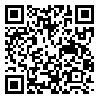BibTeX | RIS | EndNote | Medlars | ProCite | Reference Manager | RefWorks
Send citation to:
URL: http://ijpcp.iums.ac.ir/article-1-2601-en.html
2- Comprehensive Center for Counseling ,
3- Tabriz University Counseling Center, Tabriz University
Objectives: The current study aim was to examine the predicting role of emotion intensity and experiential avoidance in trait anxiety. Method: This study was a cross-sectional correlational research. The research population consisted of students who were studying in 2013-2014 second semester. Using a cluster sampling method, 197 students were selected and completed the State-Trait Anxiety Inventory, the Affect Intensity Measure, and the Acceptance and Action Questionnaire. Data were analyzed using Pearson’s correlation test and stepwise multiple regression analysis. Results: the results showed that emotion intensity (r=0.44, p<0.01) and experiential avoidance (r=0.53, p<0.01) had positive significant relationship with trait anxiety. Additionally, on the basis of stepwise multiple regression analyses, experiential avoidance and emotion intensity accounted for 0.37% of the trait anxiety variance (p<0.001). Conclusion: Based on current research results, emotion intensity and negative internal experiential avoidance could be assumed as predicting variable for the intensity of trait anxiety.
Received: 2016/11/27 | Accepted: 2016/11/27 | Published: 2016/11/27
| Rights and permissions | |
 |
This work is licensed under a Creative Commons Attribution-NonCommercial 4.0 International License. |



